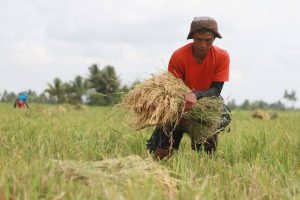 The House of Representatives Committee on Agriculture and Food launched on Tuesday, April 30, its evaluation on the effectiveness of the five-year-old Rice Tariffication Law (RTL) on the country’s agriculture sector.
The House of Representatives Committee on Agriculture and Food launched on Tuesday, April 30, its evaluation on the effectiveness of the five-year-old Rice Tariffication Law (RTL) on the country’s agriculture sector.
The panel’s chairman, Quezon 1st district Rep. Mark Enverga, underscored the need to revisit the law ahead of its mandatory review later this year.
“The clamor to revisit the law is overwhelming. Hence, prior to the mandatory review of the law before the year ends and upon the initiative of the Speaker [Martin Romualdez], we are considering the proposals to look into the gaps, the challenges, and the need to further enhance the effectiveness of the law,” said Enverga.
Enacted in 2019 under Republic Act (RA) No. 11203, the RTL lifted quantitative restrictions on rice and introduced tariffs to protect local rice producers.
This law established the Rice Competitiveness Enhancement Fund (RCEF), which sought to enhance rice productivity and support farmers. It also mandated the National Food Authority (NFA) to manage a buffer stock sourced solely from local farmers.
On Monday, implementing agencies led by the Department of Agriculture (DA) briefed the Enverga panel on their respective achievements in fulfilling their mandates under the RTL.
However, the committee raised the need for further evaluation given the law’s deficiencies in addressing the challenges that face rice farmers and the agricultural sector as a whole.
“We cannot deny the fact that the law has accorded millions of rice farmers the much-needed assistance. However, the law is always challenged when it comes to rice supply and rice prices,” Enverga said.
Aside from its failure to reduce the cost of rice, critics of the RTL pointed out how the law only exacerbated the challenges faced by local farmers—as cheaper imports now inundate the market.
As such, calls for amendments to enhance the law’s responsiveness to public needs have gained momentum. One vocal proponent is none other than DA Secretary Francisco Tiu Laurel Jr., who already submitted a proposal before the panel.
“With the proposal from the main implementer of the law, I think it is high time for us to revisit the law and its implementation,” Enverga said.
The DA’s proposed recommendations include modifications to import regulations to facilitate a more liberalized importation framework while maintaining safeguard measures.
“Five years into the [RTL], let us ask ourselves, have we really contributed to improving the lives of our rice farmers? Have we achieved the very purpose of the law?” the lawmaker asked.
Enverga said that his committee has scheduled hearings on May 6, 7, and 8, aiming to conclude deliberations before the sine die adjournment on May 24, 2024. (Manila Bulletin, Dexter Barro II)
